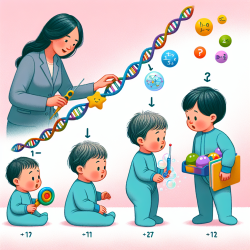The intricate relationship between genetics and sociocultural processes is a fascinating area of study that offers valuable insights for practitioners in various fields, including education and therapy. The research article "Sex-linked genetic diversity originates from persistent sociocultural processes at microgeographic scales" provides a comprehensive analysis of how these processes influence genetic variation. This blog post aims to explore how practitioners can leverage these findings to enhance their skills and improve their services.
The Core Findings of the Research
The study focuses on the genetic diversity observed in village-scale samples from two islands in eastern Indonesia: Sumba and Timor. These islands exhibit contrasting post-marital residence rules—patrilocal on Sumba and matrilocal in Timor. The research highlights the significant role of socio-genetic interactions, such as sex-biased migration and lineage-focused founder effects, in shaping genetic diversity.
One key takeaway is the importance of understanding how local social behaviors contribute to broader genetic patterns. For instance, patrilocal societies like Sumba show greater genetic variation among women due to their mobility compared to men who remain localized. Conversely, matrilocal societies like Timor exhibit greater variation among men.
Implications for Practitioners
Practitioners working with diverse populations can benefit from understanding these sociocultural dynamics. Here are some ways these insights can be applied:
- Cultural Sensitivity: Recognizing the impact of local customs on genetic diversity can enhance cultural sensitivity when working with communities. This awareness can inform more effective communication strategies and foster trust.
- Personalized Approaches: Understanding the unique sociocultural contexts of individuals can lead to more personalized and effective interventions, particularly in educational and therapeutic settings.
- Enhanced Collaboration: Collaborating with anthropologists and geneticists can provide a multidisciplinary perspective that enriches practice and contributes to more comprehensive solutions.
- Further Research: Encouraging practitioners to engage in further research can deepen their understanding of the complex interplay between genetics and culture, leading to innovative approaches in their field.
Encouraging Further Exploration
The findings from this research underscore the value of integrating genetic and sociocultural insights into practice. Practitioners are encouraged to delve deeper into this area by conducting further research or participating in interdisciplinary collaborations. Such efforts can lead to improved outcomes for clients and communities alike.
For those interested in exploring this topic further, I recommend reading the original research paper: Sex-linked genetic diversity originates from persistent sociocultural processes at microgeographic scales.










